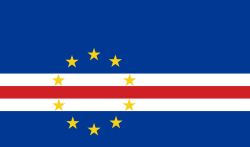Top Qs
Timeline
Chat
Perspective
Cape Verdeans
Citizens of the nation of Cape Verde From Wikipedia, the free encyclopedia
Remove ads
Cape Verdeans, also called Cabo Verdeans (Portuguese: cabo-verdiano), are a people native to Cape Verde, an island nation in West Africa consisting of an archipelago in the central Atlantic Ocean. Cape Verde is a multi-ethnic society.
Remove ads
Ethnic groups
Summarize
Perspective
The Cape Verde archipelago was uninhabited when the Portuguese landed there in 1456. Africans from the main lands were brought to the islands to work on Portuguese plantations. As a result, many Cape Verdeans have a multi-ethnic ancestry. The last time racial groups were counted in Cape Verde was in the 1950 census.
Italian seamen who were granted land by the Portuguese Empire, were followed by Portuguese settlers, exiles, and Portuguese Jews (lançados) who were victims of the Inquisition. Many foreigners from other parts of the world settled in Cape Verde as their permanent country. Most of them were Dutch, French, British, Spanish, or the English, as well as some MENA population and Jews (from Lebanon and Morocco).
The most important ethnic roots for Cape Verde based on historically known presence, cultural retention and ancestral connections are those of the Mandinga, Wolof, Biafada, Papel and Bainouk ethnicities, while the remaining suspected ethnicities will show much variation in actual contributions to Cape Verde's ethnogenesis. But for each of them there is some kind of historical testimony to their presence in Cape Verde, which are the Fula, Sereer, Diola, Cassanga, Basari/Tenda, Balanta, Bijagos, Nalu, Cocoli, Baga, Susu, Jallonké, Bambara and Sape.
Remove ads
Diaspora
Prior to independence in 1975, many thousands of people emigrated from drought-stricken Portuguese Cape Verde, formerly an overseas province of Portugal. Because these people arrived using their Portuguese passports, they were registered as Portuguese immigrants by the authorities. Today, more Cape Verdeans live abroad than in Cape Verde itself, with significant emigrant[16] Cape Verdean communities in Brazil and in the United States (102,000 of Cape Verdeans descent in the U.S., with a major concentration on the New England coast from Providence, Rhode Island, to New Bedford, Massachusetts).
In 2008, Portugal's National Statistics Institute estimated that there were 68,145 Cape Verdeans who legally resided in Portugal. This made up "15.7% of all foreign nationals living legally in the country."[2]
Remove ads
Languages
Cape Verde's official language is Portuguese. It is the language of instruction and government.[citation needed]
Cape Verdean Creole is used colloquially, and is the mother tongue of virtually all Cape Verdeans. Cape Verdean Creole or Kriolu is a Portuguese-based creole, on a dialect continuum, that came from Guinea-Bissau Creole.[citation needed] There is a substantial body of literature in Creole, especially in the Santiago Creole and the São Vicente Creole. Creole has been gaining prestige since the nation's independence from Portugal.[citation needed]
Religion

Religion in Cape Verde (2010)[17]
- Catholic Church (78.7%)
- Other Christian (10.4%)
- Other or Non Religious (10.9%)
More than 80% of the population of Cape Verde is nominally Roman Catholic, according to an informal poll taken by local churches.[18] About 5% of the population is Protestant.[19] The largest Protestant denomination is the Church of the Nazarene.[18]
Other religious groups include the Seventh-day Adventist Church, the Church of Jesus Christ of Latter-day Saints, the Assemblies of God, the Universal Church of the Kingdom of God, the New Apostolic Church, and various other Pentecostal and evangelical groups.[18] There are also small Baháʼí communities and a small Muslim community.[18] The number of atheists is estimated at less than 1 percent of the population.[18]
Remove ads
Culture
The culture of Cape Verde reflects its mixed West African (Badiu) and Portuguese roots. It is well known for its diverse forms of music such as Morna, and a wide variety of dances: the soft dance Morna, the Funaná, the extreme sensuality of coladeira, and the Batuque dance. These are reflective of the diverse origins of Cape Verde's residents. The term "Criolo", or also "Kriolu"[20] is used to refer to residents as well as the culture of Cape Verde.
Remove ads
See also
- List of Cape Verdeans
- Cape Verdean diaspora where there are lists of more people of Cape Verdean descent around the world
References
Wikiwand - on
Seamless Wikipedia browsing. On steroids.
Remove ads

